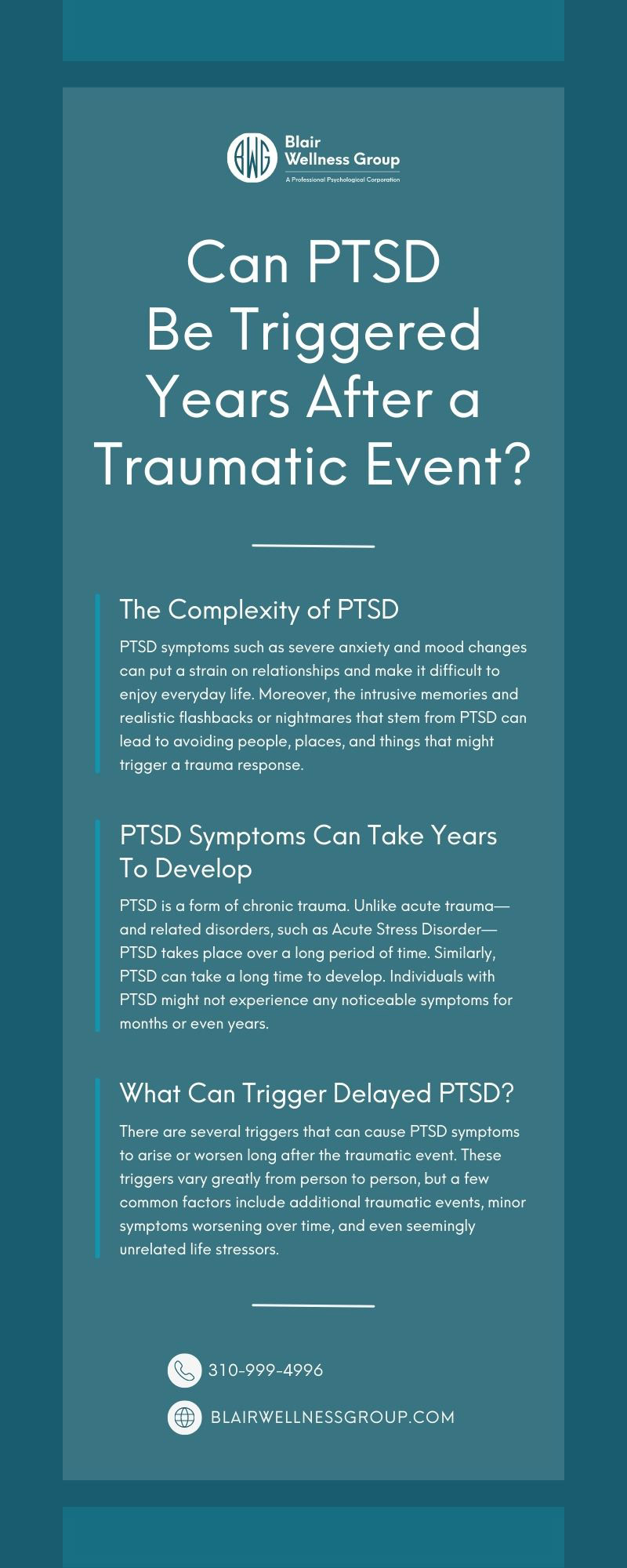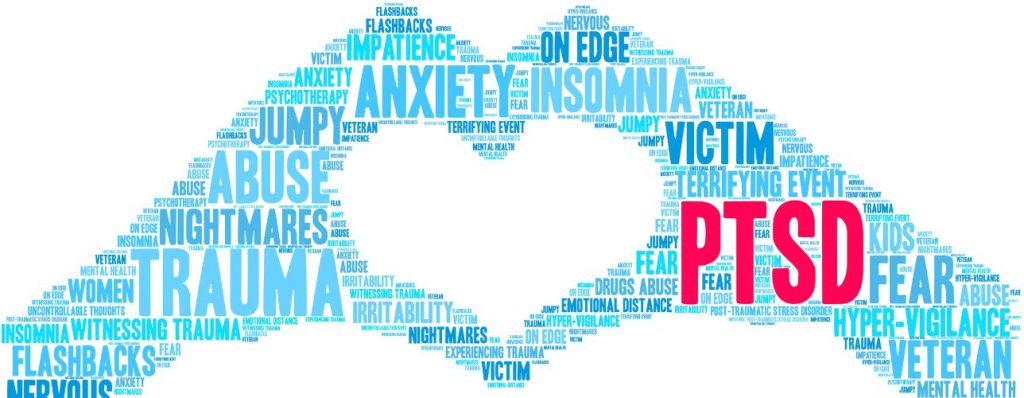Post-Traumatic Stress Disorder (PTSD) is a Mental Health Condition that encompasses a wide range of severe symptoms. Individuals with PTSD experience overwhelming anxiety, intense mood changes, intrusive thoughts and fears, and realistic flashbacks or memories of a traumatic experience. The symptoms of PTSD can last for years. However, some individuals don’t experience these symptoms until long after their traumatic experience has occurred.
PTSD can be triggered years after a traumatic event. Because trauma is such a complex and personal experience, the causes of PTSD and its symptoms vary greatly from person to person. If you experience PTSD any time after a traumatic event, a tailored treatment plan of scientifically proven treatments is the key to overcoming your symptoms and finding peace in your life. Learn more about PTSD, its effects on your daily life, and how a Licensed Clinical Psychologist can help with this overview.
The Complexity of PTSD
PTSD is much more than a poor reaction to trauma. This complex disorder has lasting consequences that, without professional help, affect every aspect of your life.
PTSD symptoms such as severe anxiety and mood changes can put a strain on relationships and make it difficult to enjoy everyday life. Moreover, the intrusive memories and realistic flashbacks or nightmares that stem from PTSD can lead to avoiding people, places, and things that might trigger a trauma response. In addition, PTSD can create severe limitations in your life and hold you back from relationships, professional goals, and personal development.
Because of the complexity of this disorder, no two cases of PTSD are the same. For this reason, Skilled Psychologists take a personalized approach to PTSD treatments. However, the unpredictability of PTSD can also create complications, such as delayed symptoms and the development of PTSD over a long period of time.
PTSD Symptoms Can Take Years To Develop
PTSD is a form of chronic trauma. Unlike acute trauma—and related disorders, such as Acute Stress Disorder—PTSD takes place over a long period of time. Similarly, PTSD can take a long time to develop. Individuals with PTSD might not experience any noticeable symptoms for months or even years.
This delayed response can occur for several reasons, including suppressing negative emotions, avoiding triggers, or even becoming distracted by other life factors. However, PTSD can worsen over time or be re-triggered by various life events. This causes PTSD symptoms to arise long after the traumatic event occurred.
What Can Trigger Delayed PTSD?
PTSD doesn’t occur without a traumatic experience. If an individual suddenly experiences new PTSD symptoms with no immediate cause, it’s almost always due to a past event or experience that has become relevant in their mind again.
There are several triggers that can cause PTSD symptoms to arise or worsen long after the traumatic event. These triggers vary greatly from person to person, but a few common factors include additional traumatic events, minor symptoms worsening over time, and even seemingly unrelated life stressors.
Another Traumatic Event
Even if you don’t experience PTSD symptoms after a traumatic event, having a similar traumatic experience can bring those symptoms to light. For example, a member of the military might come home from their first tour of duty and not experience the effects of PTSD. However, PTSD symptoms might start to arise after a second or third tour of duty.
Experiencing additional traumatic events brings back memories of the original trauma. These experiences build upon each other and can lead to worsening symptoms over time if you don’t seek professional treatment.
For example, someone who witnesses domestic violence between their parents as a child might not initially show signs of PTSD despite experiencing this form of trauma. However, experiencing abuse at the hands of a romantic partner later in life might trigger delayed symptoms of PTSD. Suffering additional trauma hinders your ability to cope with past traumatic experiences, thus increasing your likelihood of exhibiting PTSD symptoms.
Worsening of Existing PTSD Symptoms
Even if the symptoms take years to show up, PTSD doesn’t come out of nowhere. In many cases, a delayed reaction to a traumatic event is the result of minor symptoms going unnoticed. An individual with PTSD might misidentify the effects of their trauma or experience symptoms so minor that they’re easy to ignore.
Unfortunately, even minor symptoms can grow into severe problems without interference. These minor symptoms might flare up into noticeable PTSD symptoms because of a triggering event, or they might simply worsen over time until they become too significant to ignore.
Additional Life Stressors
PTSD symptoms can also arise due to non-traumatic triggers. Experiences like losing a job, going through a bad breakup, or losing a loved one can serve as a reminder of past trauma. These experiences may be another reminder of trauma that triggers PTSD symptoms.
Sometimes, though, these stressful experiences simply make you more vulnerable to the effects of PTSD. For example, stress from losing a job can lead to sleep deprivation, which in turn worsens anxiety, a major symptom of PTSD. Negative thoughts, feelings, and behaviors following a stressful experience create significant risk factors that can lead to the development or worsening of PTSD symptoms.
Comorbid Conditions
PTSD often coincides with other Mental Health Conditions such as depression, anxiety, and Addiction Disorders. These comorbid conditions exacerbate each other and create a negative cycle that worsens symptoms over time. Conditions like depression or addiction can even be a cause of PTSD symptoms that emerge years later.
No matter when signs of PTSD arise, it’s important to address these comorbid conditions along with PTSD itself. Treating one without the other will never help the problem completely go away. A Skilled Psychologist understands how comorbid conditions affect each other as well as how their symptoms overlap in your life. With this knowledge, your Licensed Clinical Psychologist can create a tailored treatment plan that addresses your unique experiences with PTSD, its symptoms, and any coinciding Mental Health Conditions.
Trauma Treatment Offers Healing
Experiencing a PTSD trigger years after the traumatic event doesn’t make the symptoms any easier. Fortunately, there are ways to work through your symptoms and heal from trauma. With the help of an expert Trauma Psychologist in the Beverly Hills, Bel Air, Century City, Brentwood, Westwood, Irvine, Newport Beach, Orange County, Huntington Beach, Laguna Beach, Corona Del Mar, Dana Point, Mission Viejo, or Aliso Viejo area, you can overcome the challenges of PTSD, achieve your clinical goals, and build a healthier, happier life for yourself.















